Serving 866 students in grades Prekindergarten-8, John I. Smith K-8 Center ranks in the top 50% of all schools in Florida for overall test scores (math proficiency is top 50%, and reading proficiency is top 50%).
The percentage of students achieving proficiency in math is 54% (which is higher than the Florida state average of 52%). The percentage of students achieving proficiency in reading/language arts is 54% (which is higher than the Florida state average of 52%).
The student:teacher ratio of 16:1 is lower than the Florida state level of 17:1.
Minority enrollment is 96% of the student body (majority Hispanic), which is higher than the Florida state average of 65% (majority Hispanic).
Quick Stats (2025)
- Grades: Prekindergarten-8
- Enrollment: 866 students
- Student:Teacher Ratio: 16:1
- Minority Enrollment: 96%
- Overall Testing Rank: Top 50% in FL
- Math Proficiency: 54% (Top 50%)
- Reading Proficiency: 54% (Top 50%)
- Science Proficiency: 49% (Top 50%)
- Source: National Center for Education Statistics (NCES), FL Dept. of Education
School Overview
John I. Smith K-8 Center's student population of 866 students has declined by 50% over five school years.
The teacher population of 55 teachers has declined by 50% over five school years.
Grades Offered
Grades Prekindergarten-8
Total Students
866 students
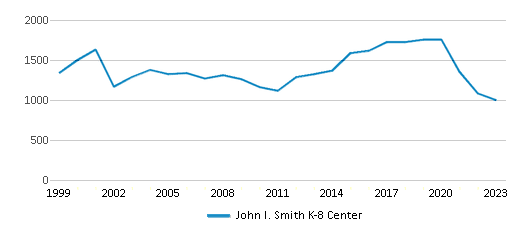
Gender %
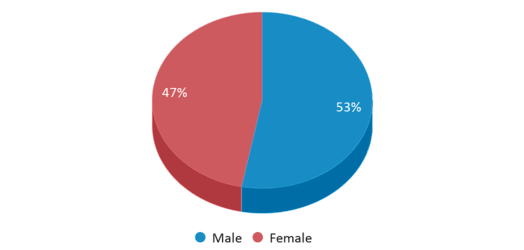
Total Classroom Teachers
55 teachers
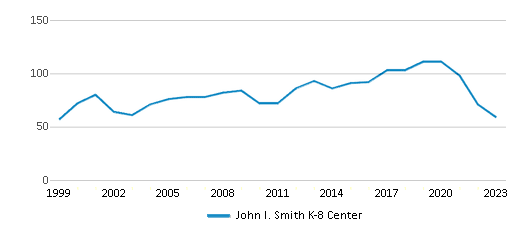
Students by Grade
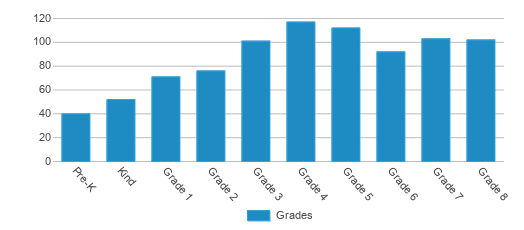
School Rankings
John I. Smith K-8 Center ranks within the top 50% of all 3,704 schools in Florida (based off of combined math and reading proficiency testing data).
The diversity score of John I. Smith K-8 Center is 0.17, which is less than the diversity score at state average of 0.70. The school's diversity has stayed relatively flat over five school years.
Overall Testing Rank
#1500 out of 3704 schools
(Top 50%)
(Top 50%)
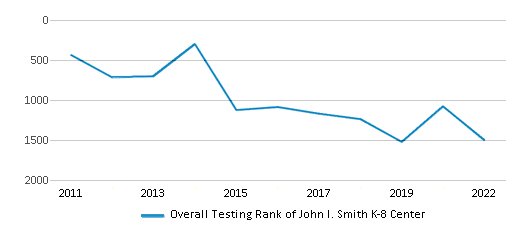
Math Test Scores (% Proficient)
54%
52%
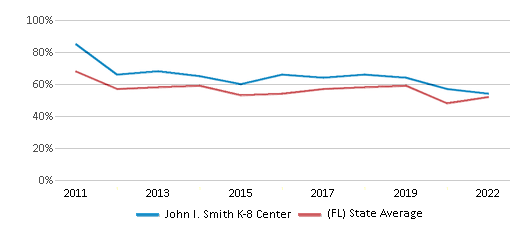
Reading/Language Arts Test Scores (% Proficient)
54%
52%
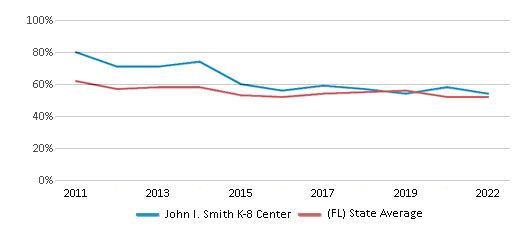
Science Test Scores (% Proficient)
49%
52%
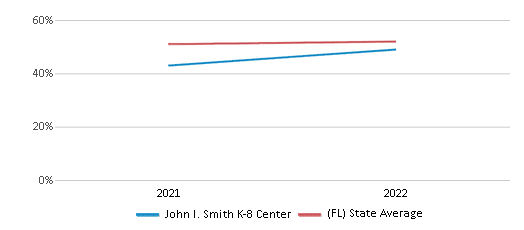
Student : Teacher Ratio
16:1
17:1
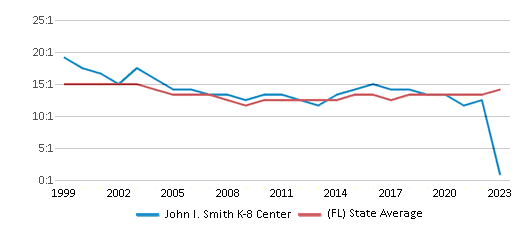
American Indian
n/a
n/a
Asian
3%
3%
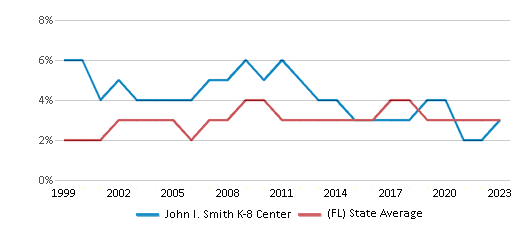
Hispanic
91%
37%
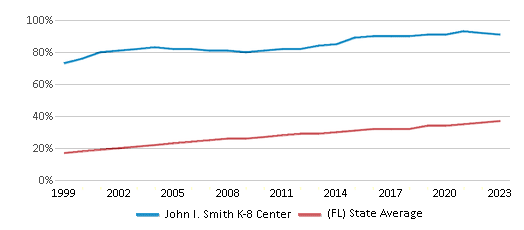
Black
2%
21%
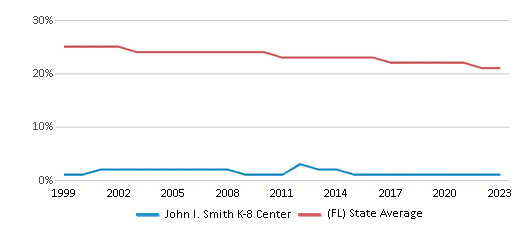
White
4%
35%
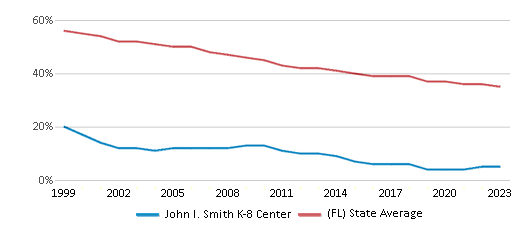
Hawaiian
n/a
n/a
Two or more races
n/a
4%
All Ethnic Groups
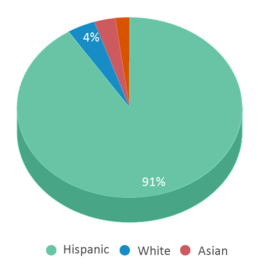
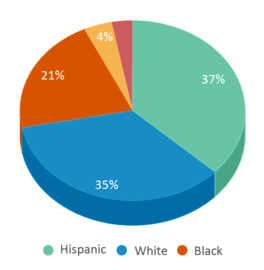
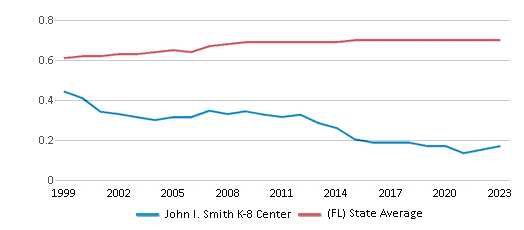
Participates in the National School Lunch Program (NSLP)
Yes
Eligible for Free Lunch
26%
47%
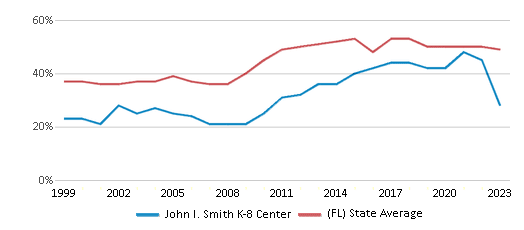
Eligible for Reduced Lunch
3%
4%
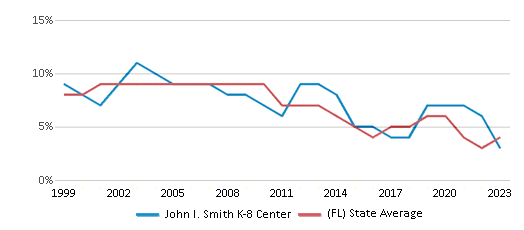
School Statewide Testing
School District Name
Source: National Center for Education Statistics (NCES), FL Dept. of Education
Profile last updated: 02/09/2025
Frequently Asked Questions
What is John I. Smith K-8 Center's ranking?
John I. Smith K-8 Center is ranked #1500 out of 3,704 schools, which ranks it among the top 50% of public schools in Florida.
What schools are John I. Smith K-8 Center often compared to?
John I. Smith K-8 Centeris often viewed alongside schools like Eugenia B. Thomas K-8 Center, Dr. Rolando Espinosa K-8 Center by visitors of our site.
What percent of students have achieved state testing proficiency in math and reading?
54% of students have achieved math proficiency (compared to the 52% FL state average), while 54% of students have achieved reading proficiency (compared to the 52% FL state average).
How many students attend John I. Smith K-8 Center?
866 students attend John I. Smith K-8 Center.
What is the racial composition of the student body?
91% of John I. Smith K-8 Center students are Hispanic, 4% of students are White, 3% of students are Asian, and 2% of students are Black.
What is the student:teacher ratio of John I. Smith K-8 Center?
John I. Smith K-8 Center has a student ration of 16:1, which is lower than the Florida state average of 17:1.
What grades does John I. Smith K-8 Center offer ?
John I. Smith K-8 Center offers enrollment in grades Prekindergarten-8
What school district is John I. Smith K-8 Center part of?
John I. Smith K-8 Center is part of Miami-Dade School District.
School Calendar
View the John I. Smith K-8 Center yearly calendar below.
School Reviews
5 6/1/2020
It is a great school.
2 1/25/2011
Since starting at this school, my son has gone from an honor student to not passing. I can associate it directly with his teachers, they do not put effort into ensuring students don't get left behind. The school administration also does not seem to care about the students, just their FCAT score. My son has special needs and transferred here with an IEP, even though we turned it in it was not reviewed for over 6 months, then they acted surprised when it was sitting in his file the whole time. The following year they once again acted surprised 3 weeks into the school year to find out that he had an IEP from the previous year AT THIS SCHOOL!!!. They don't have any capability to work with any special needs and only use it as an excuse to void my sons FCAT which means they no longer have to worry about him. They don't ensure he knows what homework he has, they don't ask him to turn it in, but then they mark it as incomplete even though it was and was just sitting in his bag. I am very very unhappy with this school. One final note...if you don't speak spanish, don't come here.
Review John I. Smith K-8 Center. Reviews should be a few sentences in length. Please include any comments on:
- Quality of academic programs, teachers, and facilities
- Availability of music, art, sports and other extracurricular activities
Recent Articles

What Is A Charter School?
Explore the world of charter schools in this comprehensive guide. Learn about their history, how they operate, and the pros and cons of this educational innovation. Discover key facts about charter schools, including admission policies, demographics, and funding, as well as what to look for when considering a charter school for your child.

10 Reasons Why High School Sports Benefit Students
Discover the 10 compelling reasons why high school sports are beneficial for students. This comprehensive article explores how athletics enhance academic performance, foster personal growth, and develop crucial life skills. From improved fitness and time management to leadership development and community representation, learn why participating in high school sports can be a game-changer for students' overall success and well-being.

February 05, 2025
Understanding the U.S. Department of Education: Structure, Impact, and EvolutionWe explore how the Department of Education shapes American education, from its cabinet-level leadership to its impact on millions of students, written for general audiences seeking clarity on this vital institution.





